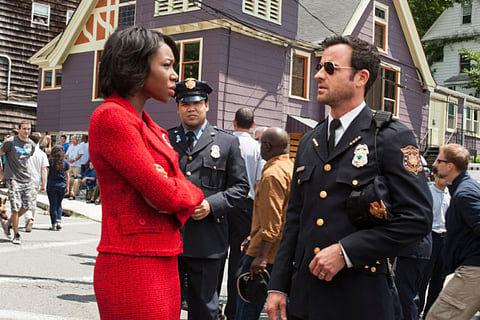Viewers have good reasons for not feeling ‘The Leftovers’
Among its fans and detractors we can all pretty much agree, the show is a study in sorrow

The clinically depressed, upside-down world of creator Damon Lindelof and author Tom Perrotta’s drama series The Leftovers, which is currently in its first season in the UAE, succeeds in one important way for television shows to succeed these days: It has caused smart people to write many, many analytical essays about it. Even now it’s hard to resist adding a few more words.
Among its fans and detractors we can all pretty much agree: The Leftovers is a study in sorrow. The acting has been brilliant. The premise (even for those who have already read Perrotta’s 2011 novel) is a beautiful and strangely imagined idea of what the rest of us might do if 2 per cent of the planet’s population suddenly vanished in an event (called the Sudden Departure) akin to the Biblical concept of rapture. Instead of ensuing apocalypse, we’re left only with permanent grief and uneasy fear.
When I first reviewed the show back in June, I somewhat correctly guessed that it wouldn’t be everyone’s favourite way to spend Sunday nights. All summer long I’ve been giving distraught and proudly discerning TV fans “permission” to stop watching The Leftovers if it wasn’t doing anything for them besides confusing them and bumming them out. (Granting absolution is one of a TV critic’s lesser known duties.) Here’s are some reasons I’ve told them it’s OK to let it go:
I totally buy The Leftovers as literature. I don’t quite buy it as a TV show. This is not like the usual “book vs. movie” debate. On the page, I believed in such concepts as a cult that took a vow of silence in response to the Sudden Departure, choosing to express themselves symbolically (all-white clothing; incessant cigarette smoking).
The cult of Holy Wayne made sense, too. In his direct and just slightly wry prose, Perrotta presented these communities as reasonably weird reactions. I even remember thinking, “Boy, I’d like to see a movie version of this.” (Not, “Boy, I’d like to this drawn out in a darker, more confusing, more violent way.”) The act of handing The Leftovers world over to Lindelof’s vision, which is far more morose and grisly, turned the novel’s concept into something that is overstated, hallucinatory and unbelievable.
Narrative abuse. (And while we’re at it: symbology abuse.) That’s a Lindelof hallmark from the Lost days. What’s real? What’s not? Is the character dreaming? Is the character remembering? Is it now? Is it then? Did what just happened actually happen? Will it have meaning later? Shouldn’t characters tell one another what just happened; wouldn’t that be a way of understanding one another? Why don’t they? “TALK!” sullen teenager Jill Garvey (Margaret Qualley) scribbled out in Sharpie on a pad to Laurie (Amy Brenneman), her wilfully mute mother.
Leave it to Lindelof to take to a story in which a fair number of the characters have taken an annoying, joyless vow of silence. Isn’t it fun to try to figure things out while you watch and feeling increasingly adrift from week to week? For many viewers the answer is no — no, it’s not fun to put in extra work for a show in which the creators have already cautioned us to never expect an explanation for its central mystery. Viewers love mysteries and narrative arcs that lead to answers. Must one really Google the May 1972 issue of National Geographic (a recurring motif that gives a viewer flashback to the Lost lottery number/hatch computer days), in hopes of keeping up? At what point did viewers agree to the idea that a TV show should come with homework?
It’s hard to care about these people. Why does Mapleton, New York, a fictional Long Island town, seem particularly more jangled three years after the Sudden Departure than the rest of the world? Why can’t its citizens get more of a grip on themselves? Why is the Guilty Remnant such a pernicious presence there? The show has been praised for its depiction of what it’s like to suffer depression — particularly when it comes to the helplessness of depression and grief that cannot be soothed. I tend to agree and I even like that aspect of the writing. But I can’t insist that people tune in for it.
What we’re left with is a true puzzle: How can one of the best shows on TV this year also be one of the worst? Make no mistake — I look forward to Season 2 next year. But I expect many would-be viewers will be among the missing.
Sign up for the Daily Briefing
Get the latest news and updates straight to your inbox


